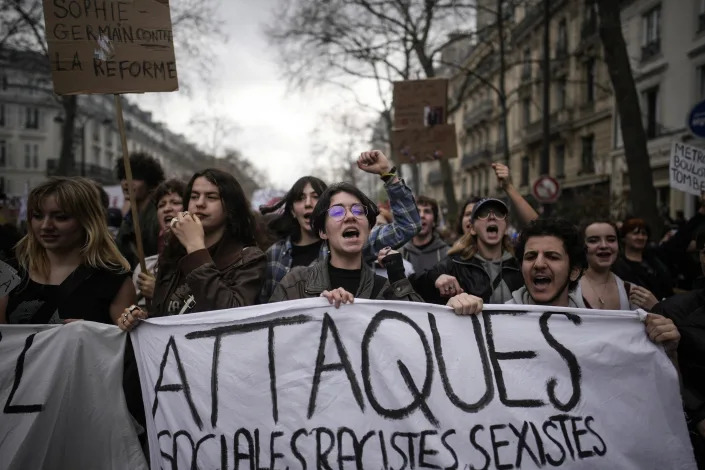
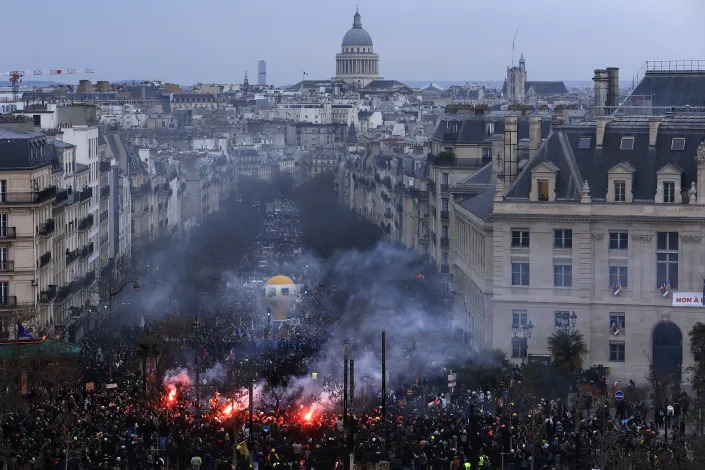
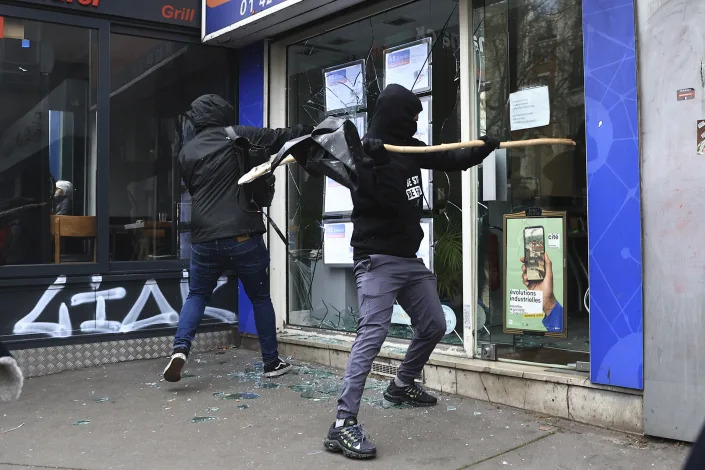
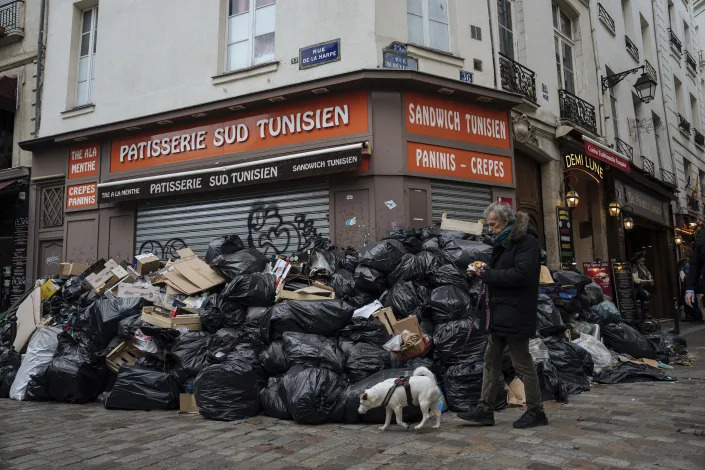
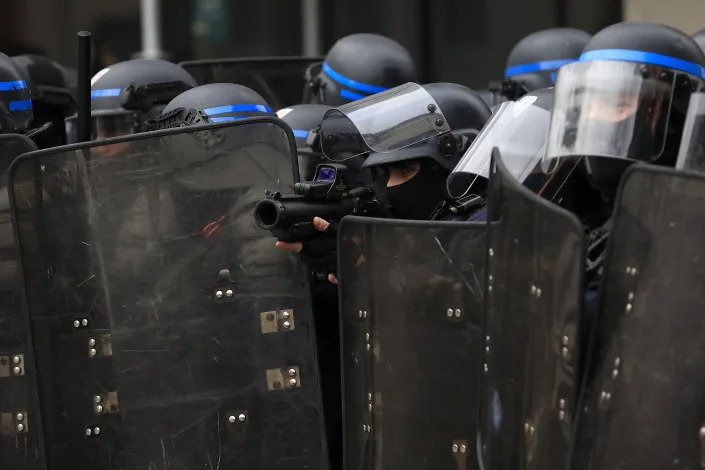
- A riot police officer aims during clashes as part of a demonstration in Paris, on March 7, 2023. French President Emmanuel Macron has ignited a firestorm of anger with unpopular pension reforms that he rammed through parliament. Young people, some of them first-time demonstrators, are joining protests against him. Violence is also picking up.
(AP Photo/Aurelien Morissard, File)
JOHN LEICESTER
Mon, March 27, 2023
PARIS (AP) — A big day has come for French high school student Elisa Fares. At age 17, she is taking part in her first protest.
In a country that taught the world about people power with its revolution of 1789 — and a country again seething with anger against its leaders — graduating from bystander to demonstrator is a generations-old rite of passage. Fares looks both excited and nervous as she prepares to march down Paris streets where people for centuries have similarly defied authority and declared: “Non!”
Two friends, neither older than 18 but already protest veterans whose parents took them to demonstrations when they were little, are showing Fares the ropes. They’ve readied eyedrops and gas masks in case police fire tear gas — as they have done repeatedly in recent weeks.
“The French are known for fighting and we'll fight," says one of the friends, Coline Marionneau, also 17. “My mother goes to a lot of demonstrations ... She says if you have things to say, you should protest.”
For French President Emmanuel Macron, the look of determination on their young faces only heralds deepening crisis. His government has ignited a firestorm of anger with unpopular pension reforms that he railroaded through parliament and which, most notably, push the legal retirement age from 62 to 64.
Furious not just with the prospect of working for longer but also with the way Macron imposed it, his opponents have switched to full-on disobedience mode. They're regularly striking and demonstrating and threatening to make his second and final term as president even more difficult than his first. It, too, was rocked by months of protests — often violent — by so-called yellow vest campaigners against social injustice.
Fares, the first-time protester, said her mother had been against her taking to the streets but has now given her blessing.
“She said that if I wanted to fight, she wouldn’t stop me,” the teen says.
Critics accuse Macron of effectively ruling by decree, likening him to France’s kings of old. Their reign finished badly: In the French Revolution, King Louis XVI ended up on the guillotine. There’s no danger of that happening to Macron. But hobbled in parliament and contested on the streets piled high with reeking garbage uncollected by striking workers, he’s being given a tough lesson, again, about French people power. Freshly scrawled slogans in Paris reference 1789.
So drastically has Macron lost the initiative that he was forced to indefinitely postpone a planned state visit this week by King Charles III. Germany, not France, will now get the honor of being the first overseas ally to host Charles as monarch.
The France leg of Charles' tour would have coincided with a new round of strikes and demonstrations planned for Tuesday that are again likely to mobilize many hundreds of thousands of protesters. Macron said the royal visit likely would have become their target, which risked creating a “detestable situation.”
Encouraged by that victory, the protest movement is plowing on and picking up new recruits, including some so young that it will be many decades before they'll be directly impacted by the pushed-back retirement age. Their involvement is a worrisome development for Macron, because it suggests that protests are evolving, broadening from workplace and retirement concerns to a more generalized malaise with the president and his governance.
Violence is picking up, too. Police and environmental activists fought pitched battles over the weekend in rural western France, resulting in dozens of injuries. Officers fired more than 4,000 nonlethal dispersion grenades in fending off hundreds of protesters who rained down rocks, powerful fireworks and gasoline bombs on police lines.
“Anger and resentment,” says former President François Hollande, Macron's predecessor, “are at a level that I have rarely seen.”
For Fares, whose first demonstration was a peaceful protest in Paris this weekend, the final straw was Macron’s decision to not let legislators vote on his retirement reform, because he wasn’t sure of winning a majority for it. Instead, he ordered his prime minister to skirt parliament by using a special constitutional power to ram the bill through.
It was the 11th time that Prime Minister Elisabeth Borne had to resort to the so-called Article 49.3 power in just 10 months — a telling sign of Macron’s fragility since he lost his parliamentary majority in an election last June.
“It’s an attack on democracy,” Fares said. “It annoyed me too much.”
Her friend Luna Dessommes, 18, added hopefully: “We have to use the movement to politicize more and more young people.”
At age 76, veteran protester Gilbert Leblanc has been through it all before. He was a yellow vest; by his count, he took part in more than 220 of their protests in Macron's first term, rallying to the cry that the former banker was too pro-business and "the president of the rich."
Long before that, Leblanc cut his teeth in seminal civil unrest that reshaped France in May 1968. He says that when he tells awe-struck young protesters that he was a “soixante-huitard” — a '68 veteran — they “want to take selfies with me.”
This winter, he has kept his heating off, instead saving the money for train fares to the capital, so he can protest every weekend, he said.
“My grandfather who fought in World War I, got the war medal. He would rise from his grave if he saw me sitting at home, in my sofa, not doing anything,” Leblanc said.
“Everything we've obtained has been with our tears and blood.”
JOHN LEICESTER
Mon, March 27, 2023
PARIS (AP) — A big day has come for French high school student Elisa Fares. At age 17, she is taking part in her first protest.
In a country that taught the world about people power with its revolution of 1789 — and a country again seething with anger against its leaders — graduating from bystander to demonstrator is a generations-old rite of passage. Fares looks both excited and nervous as she prepares to march down Paris streets where people for centuries have similarly defied authority and declared: “Non!”
Two friends, neither older than 18 but already protest veterans whose parents took them to demonstrations when they were little, are showing Fares the ropes. They’ve readied eyedrops and gas masks in case police fire tear gas — as they have done repeatedly in recent weeks.
“The French are known for fighting and we'll fight," says one of the friends, Coline Marionneau, also 17. “My mother goes to a lot of demonstrations ... She says if you have things to say, you should protest.”
For French President Emmanuel Macron, the look of determination on their young faces only heralds deepening crisis. His government has ignited a firestorm of anger with unpopular pension reforms that he railroaded through parliament and which, most notably, push the legal retirement age from 62 to 64.
Furious not just with the prospect of working for longer but also with the way Macron imposed it, his opponents have switched to full-on disobedience mode. They're regularly striking and demonstrating and threatening to make his second and final term as president even more difficult than his first. It, too, was rocked by months of protests — often violent — by so-called yellow vest campaigners against social injustice.
Fares, the first-time protester, said her mother had been against her taking to the streets but has now given her blessing.
“She said that if I wanted to fight, she wouldn’t stop me,” the teen says.
Critics accuse Macron of effectively ruling by decree, likening him to France’s kings of old. Their reign finished badly: In the French Revolution, King Louis XVI ended up on the guillotine. There’s no danger of that happening to Macron. But hobbled in parliament and contested on the streets piled high with reeking garbage uncollected by striking workers, he’s being given a tough lesson, again, about French people power. Freshly scrawled slogans in Paris reference 1789.
So drastically has Macron lost the initiative that he was forced to indefinitely postpone a planned state visit this week by King Charles III. Germany, not France, will now get the honor of being the first overseas ally to host Charles as monarch.
The France leg of Charles' tour would have coincided with a new round of strikes and demonstrations planned for Tuesday that are again likely to mobilize many hundreds of thousands of protesters. Macron said the royal visit likely would have become their target, which risked creating a “detestable situation.”
Encouraged by that victory, the protest movement is plowing on and picking up new recruits, including some so young that it will be many decades before they'll be directly impacted by the pushed-back retirement age. Their involvement is a worrisome development for Macron, because it suggests that protests are evolving, broadening from workplace and retirement concerns to a more generalized malaise with the president and his governance.
Violence is picking up, too. Police and environmental activists fought pitched battles over the weekend in rural western France, resulting in dozens of injuries. Officers fired more than 4,000 nonlethal dispersion grenades in fending off hundreds of protesters who rained down rocks, powerful fireworks and gasoline bombs on police lines.
“Anger and resentment,” says former President François Hollande, Macron's predecessor, “are at a level that I have rarely seen.”
For Fares, whose first demonstration was a peaceful protest in Paris this weekend, the final straw was Macron’s decision to not let legislators vote on his retirement reform, because he wasn’t sure of winning a majority for it. Instead, he ordered his prime minister to skirt parliament by using a special constitutional power to ram the bill through.
It was the 11th time that Prime Minister Elisabeth Borne had to resort to the so-called Article 49.3 power in just 10 months — a telling sign of Macron’s fragility since he lost his parliamentary majority in an election last June.
“It’s an attack on democracy,” Fares said. “It annoyed me too much.”
Her friend Luna Dessommes, 18, added hopefully: “We have to use the movement to politicize more and more young people.”
At age 76, veteran protester Gilbert Leblanc has been through it all before. He was a yellow vest; by his count, he took part in more than 220 of their protests in Macron's first term, rallying to the cry that the former banker was too pro-business and "the president of the rich."
Long before that, Leblanc cut his teeth in seminal civil unrest that reshaped France in May 1968. He says that when he tells awe-struck young protesters that he was a “soixante-huitard” — a '68 veteran — they “want to take selfies with me.”
This winter, he has kept his heating off, instead saving the money for train fares to the capital, so he can protest every weekend, he said.
“My grandfather who fought in World War I, got the war medal. He would rise from his grave if he saw me sitting at home, in my sofa, not doing anything,” Leblanc said.
“Everything we've obtained has been with our tears and blood.”
Fresh clashes rock France as protests shift to water dispute
Story by AFP • Saturday
French police again clashed with protesters Saturday as campaigners in the southwest sought to stop the construction of giant water storage facilities, the latest flashpoint as social tensions erupt nationwide.

Macron has remained defiant in the face of the protests© Emmanuel DUNAND
The violent scenes at Sainte-Soline came after days of unrest over President Emmanuel Macron's pensions reform, which forced the cancellation of a visit by King Charles III of the UK.
The protest movement against the pension reform has turned into the biggest domestic crisis of Macron's second mandate, with police and protesters clashing daily in Paris and other cities over the past week.

Protesters in France set police vans on fire© Camille CASSOU
At Sainte-Soline, several protesters and members of security forces were injured in Saturday's confrontations at the banned protest. Campaigners there are trying to stop the construction of giant water "basins" to irrigate crops, which they say will distort access to water amid drought conditions.

Several protesters and members of security forces were injured in the clashes around Sainte-Soline© Pascal LACHENAUD
A long procession of activists set off late morning for the site, numbering at least 6,000 people according to local authorities -- around 30,000 according to the organisers.
"While the country is rising up to defend pensions, we will simultaneously stand up to defend water," said the organisers.

In a tweet supporting the work of the emergency services, Prime Minister Elisabeth Borne denounced violence at Sainte-Soline© Thibaud MORITZ
Once they arrived at the construction site, which was defended by the police and gendarmes, clashes quickly broke out between the more radical activists and the security forces, AFP correspondents said.

The clashes over the water reservoir construction have added to tensions in an increasingly challenging situation for the government© Thibaud MORITZ
The authorities had mobilised more than 3,000 police officers and paramilitary gendarmes to guard the site.
Protesters threw various projectiles, including improvised explosives, while police responded with tear gas, water cannon and rubber bullets.
- 'Completely inexcusable' -
According to the latest figures from the prosecutor's office, seven demonstrators were injured, including three who had to be taken to hospital. In addition, 28 gendarmes were injured, two of them badly enough that they had to be hospitalised.

Protesters threw various projectiles, including improvised explosives, while police responded with tear gas, water cannon and rubber bullets© Thibaud MORITZ
Two journalists were also injured.
The alliance of activist groups behind the protests said 200 of their number had been injured, and one of them was fighting for their life, information not confirmed by the authorities.
In a tweet supporting the work of the emergency services there, Prime Minister Elisabeth Borne denounced "the intolerable wave of violence" at Sainte-Soline.
Interior Minister Gerald Darmanin also condemned the violence, blaming elements from the "ultra-left and the extreme left".
Eleven people were detained after police seized cold weapons, including petanque balls and meat knives, as well as explosives.
While not directly related to the anti-pensions reform campaign, the clashes over the water reservoir construction have added to tensions in an increasingly challenging situation for the government.
The government is bracing for another difficult day on Tuesday when unions are due to hold another round of strikes and protests. That would have fallen on the second full day of Charles's visit.
The recent scenes in France have sparked astonishment abroad. "Chaos reigns in France," said the Times of London above a picture of rubbish piling up.
Story by AFP • Saturday
French police again clashed with protesters Saturday as campaigners in the southwest sought to stop the construction of giant water storage facilities, the latest flashpoint as social tensions erupt nationwide.

Macron has remained defiant in the face of the protests© Emmanuel DUNAND
The violent scenes at Sainte-Soline came after days of unrest over President Emmanuel Macron's pensions reform, which forced the cancellation of a visit by King Charles III of the UK.
The protest movement against the pension reform has turned into the biggest domestic crisis of Macron's second mandate, with police and protesters clashing daily in Paris and other cities over the past week.

Protesters in France set police vans on fire© Camille CASSOU
At Sainte-Soline, several protesters and members of security forces were injured in Saturday's confrontations at the banned protest. Campaigners there are trying to stop the construction of giant water "basins" to irrigate crops, which they say will distort access to water amid drought conditions.

Several protesters and members of security forces were injured in the clashes around Sainte-Soline© Pascal LACHENAUD
A long procession of activists set off late morning for the site, numbering at least 6,000 people according to local authorities -- around 30,000 according to the organisers.
"While the country is rising up to defend pensions, we will simultaneously stand up to defend water," said the organisers.

In a tweet supporting the work of the emergency services, Prime Minister Elisabeth Borne denounced violence at Sainte-Soline© Thibaud MORITZ
Once they arrived at the construction site, which was defended by the police and gendarmes, clashes quickly broke out between the more radical activists and the security forces, AFP correspondents said.

The clashes over the water reservoir construction have added to tensions in an increasingly challenging situation for the government© Thibaud MORITZ
The authorities had mobilised more than 3,000 police officers and paramilitary gendarmes to guard the site.
Protesters threw various projectiles, including improvised explosives, while police responded with tear gas, water cannon and rubber bullets.
- 'Completely inexcusable' -
According to the latest figures from the prosecutor's office, seven demonstrators were injured, including three who had to be taken to hospital. In addition, 28 gendarmes were injured, two of them badly enough that they had to be hospitalised.

Protesters threw various projectiles, including improvised explosives, while police responded with tear gas, water cannon and rubber bullets© Thibaud MORITZ
Two journalists were also injured.
The alliance of activist groups behind the protests said 200 of their number had been injured, and one of them was fighting for their life, information not confirmed by the authorities.
In a tweet supporting the work of the emergency services there, Prime Minister Elisabeth Borne denounced "the intolerable wave of violence" at Sainte-Soline.
Interior Minister Gerald Darmanin also condemned the violence, blaming elements from the "ultra-left and the extreme left".
Eleven people were detained after police seized cold weapons, including petanque balls and meat knives, as well as explosives.
While not directly related to the anti-pensions reform campaign, the clashes over the water reservoir construction have added to tensions in an increasingly challenging situation for the government.
The government is bracing for another difficult day on Tuesday when unions are due to hold another round of strikes and protests. That would have fallen on the second full day of Charles's visit.
The recent scenes in France have sparked astonishment abroad. "Chaos reigns in France," said the Times of London above a picture of rubbish piling up.
Protesters in France set police vans on fire Duration 0:24
 AFP View on Watch
AFP View on Watch

DailymotionViolent clashes between police and protesters at French anti-reservoir protest
0:35

WIONFrench reservoir protest: Violent clashes between police and protesters
5:19

Global NewsFrench protesters against farm water reservoir clash with riot police, light car on fire
2:27
In France, Macron has faced accusations from the left that he removed a luxury watch in the middle of a television interview Wednesday, fearing images of the timepiece could further damage his reputation.
- 'I will not give up' -
Uproar over legislation to raise the retirement age from 62 to 64 was inflamed when Macron exercised a controversial executive power to push the plan through parliament without a vote last week.
The streets of the capital are strewn with rubbish because of a strike by waste collectors.
But there has also been controversy over the tactics used by the French security forces to disperse the protests.
On Friday, the Council of Europe warned that sporadic violence in protests "cannot justify excessive use of force".
Macron has refused to offer concessions, saying in a televised interview Wednesday that the changes needed to "come into force by the end of the year".
The Le Monde daily said Macron's "inflexibility" was now worrying even "his own troops" among the ruling party.
In another sign of the febrile atmosphere, the leader of Macron's faction in parliament, Aurore Berge, posted on Twitter a handwritten letter she received threatening her four-month-old baby with physical violence, prompting expressions of solidarity across the political spectrum.
It remains unclear how the government will defuse the crisis, four years after the "Yellow Vest" demonstrations rocked the country.
Borne is under particular pressure.
But she told a conference on Saturday: "I will not give up on building compromises...
"I am here to find agreements and carry out the transformations necessary for our country and for the French," she said.
bur-jj/fb
 AFP View on Watch
AFP View on Watch
DailymotionViolent clashes between police and protesters at French anti-reservoir protest
0:35

WIONFrench reservoir protest: Violent clashes between police and protesters
5:19

Global NewsFrench protesters against farm water reservoir clash with riot police, light car on fire
2:27
In France, Macron has faced accusations from the left that he removed a luxury watch in the middle of a television interview Wednesday, fearing images of the timepiece could further damage his reputation.
- 'I will not give up' -
Uproar over legislation to raise the retirement age from 62 to 64 was inflamed when Macron exercised a controversial executive power to push the plan through parliament without a vote last week.
The streets of the capital are strewn with rubbish because of a strike by waste collectors.
But there has also been controversy over the tactics used by the French security forces to disperse the protests.
On Friday, the Council of Europe warned that sporadic violence in protests "cannot justify excessive use of force".
Macron has refused to offer concessions, saying in a televised interview Wednesday that the changes needed to "come into force by the end of the year".
The Le Monde daily said Macron's "inflexibility" was now worrying even "his own troops" among the ruling party.
In another sign of the febrile atmosphere, the leader of Macron's faction in parliament, Aurore Berge, posted on Twitter a handwritten letter she received threatening her four-month-old baby with physical violence, prompting expressions of solidarity across the political spectrum.
It remains unclear how the government will defuse the crisis, four years after the "Yellow Vest" demonstrations rocked the country.
Borne is under particular pressure.
But she told a conference on Saturday: "I will not give up on building compromises...
"I am here to find agreements and carry out the transformations necessary for our country and for the French," she said.
bur-jj/fb
No comments:
Post a Comment